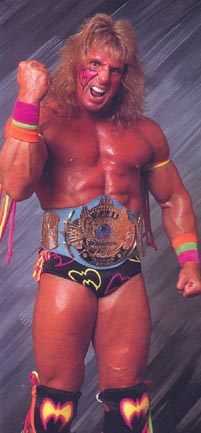Wrestler "Warrior" Avoids Game Maker's Motion to Dismiss Trademark Claims
Ultimate Creations, Inc., the licensing company owned by former professional wrestler Warrior (his legal name) brought suit in the District of Arizona against video game maker THQ Inc. over video games that use Ultimate’s WARRIOR registered trademark and and trade dress in the wrestler’s costume and image. THQ moved for summary judgment on grounds of fair use and the protectability of Ultimate’s unregistered trade dress. On Jan. 24, Judge Stephen McNamee found in Ultimate’s favor.
The court summarized the facts as follows:
 “Warrior claims that his wrestling character was distinctive because he had long, flowing hair, wore arm pads and knee pads with a fringe, displayed on his costume and face a logo roughly in the shape of an upside-down ‘W’ — the logo, originated from ‘Parts Unknown,’ had an exceptionally muscular build, and used ‘signature’ moves in his wrestling performances.
“Warrior claims that his wrestling character was distinctive because he had long, flowing hair, wore arm pads and knee pads with a fringe, displayed on his costume and face a logo roughly in the shape of an upside-down ‘W’ — the logo, originated from ‘Parts Unknown,’ had an exceptionally muscular build, and used ‘signature’ moves in his wrestling performances.
“In 2003, the parties entered into negotiations to license intellectual property associated with Warrior. The draft license agreement included the use of Warrior’s ‘name, voice, facsimile signature, nickname, likeness, signature moves, entrance music, endorsement, right of publicity, and biographical sketch as it may appear in photographs, film, video clips, etc.’ However, the negotiations eventually terminated without entering into a contract.”
In the lawsuit, “Plaintiff alleges that Defendant began to use the likeness, moves, trade dress, marks, and other intellectual property associated with Warrior in its video game as early as October of 2003. Specifically, players may use the [Create-A-Wrestler] feature on the games to create a character that has a similar build, face paint, and logo symbol as Warrior, that uses the entrance and finishing moves found under the label ‘OUW’ that are similar to Warrior’s, that has the call name ‘The Warrior’ or ‘Warrior,’ and is from ‘Parts Unknown.’ Plaintiff contends that this feature causes confusion as to whether Plaintiff sponsored or is associated with the game.”
On THQ’s fair use defense, the court concluded: “Defendant argues that it used the name ‘Warrior’ descriptively and not as a mark, and thus its use was fair. Despite this assertion, the Court finds that a jury could find that neither the mark nor the similar symbol was used in good faith based on the prior, unsuccessful negotiations between the parties. What is clear is that the use of the name Warrior was not necessary to create or market the video games. Also, the combination of signature moves, the face paint, the similar symbol and ‘Warrior’ call name suggests that Defendant intentionally provided the tools for consumers to create a wrestler in the likeness of Warrior without regard to his intellectual property rights. Thus, a jury could conclude that Defendant’s use was an improper attempt to capitalize on the popularity of the Warrior wrestling character. As such, summary judgment on Plaintiff’s claim of infringement of registered trademarks and service marks is not proper.”
As for Ultimate’s trade dress claim, the court found: “Warrior’s trade dress involves the costume, symbol, face paint, and color combinations that make up the overall image of his wrestling character. Through the video games, Defendant has made these elements available to its consumers. The websites where players exchange information regarding how to create the Warrior wrestling character suggest that Warrior has a distinctive trade dress, which supports a finding of secondary meaning in Warrior’s overall appearance, and denotes possible confusion as to whether the video games are affiliated with Warrior himself. The elements of trade dress also appear to be non-functional, and the combination of the elements may be sufficient to create a distinctive trade dress that is capable of protection. Thus, taken as a whole, a reasonable person could find that Defendant has committed a violation of Plaintiff’s unregistered trademarks or trade dress under Section 43(a) by confusing consumers as to Plaintiff’s affiliation, connection, or association with Defendant’s games.”
The case cite is Ultimate Creations, Inc. v. THQ Inc., 2008 WL 215827, No. 05-1134 (D. Ariz. Jan. 24, 2008).
References (3)
-
 Response: Appellate lawyerBrownstone Law
Response: Appellate lawyerBrownstone Law -
 Response: what do lifeguards doAmerican Lifeguard Association
Response: what do lifeguards doAmerican Lifeguard Association -
 Response: Lifeguard courses
Response: Lifeguard courses
Reader Comments